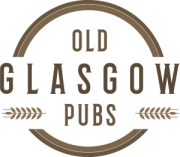79 Albion Street, Glasgow. G1 1NP. Tel: 0141 400 9151.
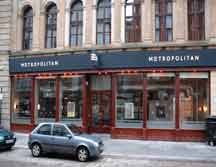
Metropolitan. 2005.
79 Albion Street, Glasgow. G1 1NP. Tel: 0141 400 9151.

Metropolitan. 2005.
20 Candleriggs, Glasgow. G1 1LD. Tel: 0141 564 1285.
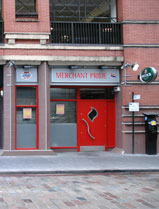
Merchant Pride. 2005.
Formerly known as Waxworks and Paddy O’Brien’s Dream and McCool’s.
Clyde Street, Glasgow.
Check back soon for the history of this pub.
143 King Street, Pollokshaws. later Shawbridge Street, Glasgow.

Mr William Reid Fleming. Proprietor of the Masons’ Arms, 143 King Street, Pollokshaws. 1899.
Mr William Reid Fleming was born in the adjacent village of Strathbungo in 1867. His father John Fleming was long connected with the spirit trade, but left it and became a surfaceman in the employment of the North British Railway Company.
When young William was still a boy he moved with his parents to Tollcross, where he received his education at Carmyle and latterly attended the Board School at Mount Vernon under Mr Young.
On leaving school he entered into the licensed grocery business, joining the staff of Mr Thomas Robertson, of Tollcross, with whom he remained for four years. This was a fortunate start in life for him as he gained the knowledge of the business in its every detail, being in charge of the van as well as inside the shop.
He then left for the big city of Glasgow and entered the employment of James Arthur and Company Ltd., Queen Street, the largest business of its kind in Scotland. He selected the umbrella department, where he served his apprenticeship as a cutter, and remained for the long period of fourteen years.
During this time he still kept up a close connection with the licensed trade, working on holidays, in the evenings and Saturdays. Again he entered the trade and went as second hand to Mrs Robertson, of Shettleston, and after a year was promoted to manager, where he spent three years in all.
He then went to Cumbernauld to take charge of his grand-mothers old established shop. Old Mr Fleming had died, and the business was offered and accepted to young William to carry on the business on behalf of the young children, a duty which he continued for three years.
William Reid Fleming then acquired the Masons’ Arms in King Street, Pollokshaws around 1897. William was a keen Mason himself of Lodge 199, Cumbernauld, of which he was secretary for two years, and on coming to Pollokshaws he was affiliated to Lodge Royal Arch, 153, Pollokshaws, of which he held the office of Steward in 1898.
He was also a member of the Burns Club, he bowled with the Pollokshaws Bowling Club and curled with the Pollok Curling Club. He was also a member of the Shepherd’s Friendly Society of Cumbernauld, sang a good song and was fond of outdoor amusements. In June 1897 he was fortunate in marrying Miss Calder, daughter of Robert Calder, wine and spirit merchant, Main Street, Cumbernauld.
William was a member of the Wine, Beer and Spirit Trade Defence Association. A very busy man in his time.
William sadly passed away in 1914, his wife then took over the running of the business. She paid an annul rent of £49.
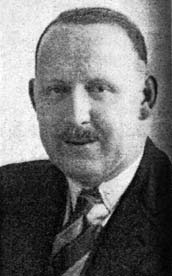
Mr William Reid Fleming. 1947.
In March 1947 Mr Fleming celebrated a unique occasion on fifty years that his late father William senior took over the Masons’ Arms. He took over the business in 1930, he had business interests in Largs where he was proprietor of the Jubilee Bar, which he took over from Mr Sam Galbraith in 1941. He too like his father was a member of the Royalty Burns Club and regularly attended at the clubs bowling outings.
The last member of the family to run the business was Janet Fleming and continued until the pub was closed down in the 1960s.
Licence Holders…
21 Waterloo Street, Glasgow.
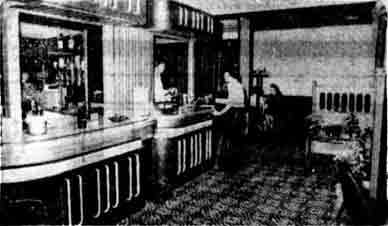
The Marquis, Interior of the lounge 1978.
In the NEWS 1978…
A Feast in Luxury from the Marquis…
It’s always refreshing to find a new restaurant that offers delicious food, at reasonable prices and served in pleasant surroundings.
But that just about sums up the Marquis, a new restaurant and cocktail bar which has just opened in Glasgow’s Waterloo Street.
The Marquis is owned by Mr Harry Nicholas, who has also owned Paisley’s Glynhill Hotel for the past eight years.
Following his success at the Glynhill, Mr Nicholas decided it was time to expand into Glasgow.
The Marquis is designed especially for people who appreciate good food and who want to dine in a relaxed atmosphere. Mr Nicholas has spared no expense in the decoration. Everything from the pure wool on the booth seats to the mahogany ceilings and partitions exudes quality. Only the best of materials has been used.
Undoubtedly the main feature is the actual bar in the cocktail lounge. It has been custom made in teak by Mr Tony Capriotti and is a beautiful piece of work.
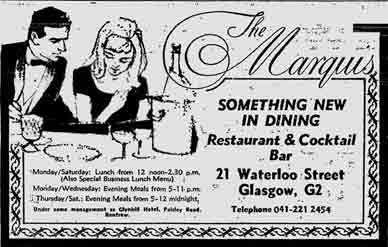
FUNCTIONS
The Marquis has been designed on two levels. The lower level has the cocktail bar and part of the restaurant, while the upper level has a smaller restaurant, ideal for holding small functions.
In fact, although the Marquis has been open for only two weeks there have been two functions held already. The most important point about any restaurant is the food. And the Marquis comes up trumps.
The restaurant has an extensive menu which includes everything from steaks to moussaka. For the younger set, perhaps looking for a quick meal before going to the cinema, there are American-style char-cooked chopped beefburgers served with a relish tray and French Fries.
If you prefer a more substantial meal which you can linger over you can take your choice from a selection of steaks, including T-bone and porterhouse.
But if your eating tastes are a little adventurous then the Marquis can offer you a choice of continental dishes, many of them Greek. How does Dolmades sound for starters? That’s chopped meats with rice and herbs rolled and cooked in vine leaves.
You can follow that with Kleftiko lamb roasted in its own juices and herbs. It is served with roast or boiled potatoes and individual mixed salad. The Marquis also has a selection of Yugoslavian, Italian, German, and French wines.
One good point about the menu is that it contains no hidden extras. potatoes and vegetables are included in the price of the main meal. In charge of the Marquis is Mrs Margaret MacCallum, who has been in management at the Glynhill Hotel for eight years.
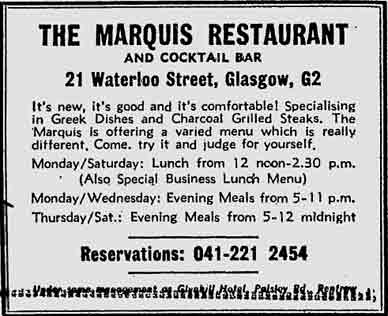
She has a staff of around 20 including two chefs and is delighted with the way the new restaurant has turned out. “It really is in the ideal position,” she pointed out. “We are only about two hundred yards from Central Station and only a few minutes from Anderston Bus Station.
So we are very handy for people arriving in the city and who are perhaps looking for a quiet meal after a long journey.”
The Marquis is open from 12-2.20 from Monday to Saturday, from 5-11 p.m. Monday to Wednesday, and 5-12 p.m. from Thursday to Saturday.
They offer a businessman’s lunch from Monday to Friday.
—————————————————
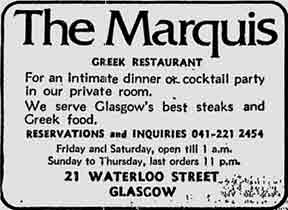
The Marquis advert 1979.
54 George Street, Glasgow.
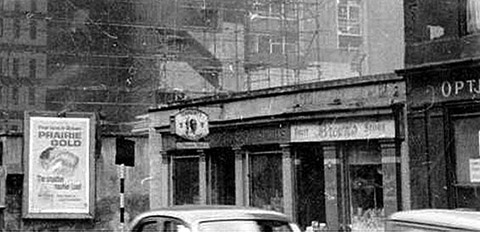
The Marland Bar, George Street. 1959.
The Marland Bar was once one of the haunts for the folk singers in Glasgow that loved to sing in Glasgow pubs, but singing was band in those days.
There’s been a pub on this site since 1830.
This is from a great book called Cod Liver Oil and The Orange Juice, reminiscences of a fat folk singer, Hamish Imlach and Ewan McVicar…
Page 54-55…
There were lots of all-night parties, and SNP dos to go to. People drank in the Eagle Inn or the Dunrobin. Singing in pubs was illegal at the time, and eventually the Marland Bar became the undisputed place to drink in, because they’s allow illicit singing with the drinking.
One Saturday we were thrown out of the Queen’s Own pub, off George Square, for persistent singing. Usually we’d go into the Dunrobin, and mumble the words of the songs in one of the booths. This time we went along George Street, found the next pub along was crowded- it being nine o’clock on a Saturday night- and went into the following one, the Marland Bar. There was a back room, which we all crowded into, and managed to order a couple of rounds before nine-thirty closing time.
The only other people in the back room were an old gent and his wife and daughter. He was a wonderful Donegal singer called Paddy Tourish. I didn’t know him then, but I could see from the murals on the walls it was a Donegal pub- murals which had been done by a guy who had been paid in drink, and it showed. On a sloping counter lay a half crown which was in fact bolted from the bottom, put there to entice strangers into putting a hat over it and trying to scrape it oiff the bar.
I thought “What the hell”, and sang Boolavogue.
At Boolavogue, as the sun was setting
O’er the bright Mary meadows of Shemalier
A rebel band set the beather blazing
And brought the neighbours from far and near
And father Murphy, from old Kilcormack
Spurred up the rocks, with a warning cry
“To arms’, he cried, ‘For I come to lead you
For Ireland’s freedom we’ll fight or die”.
Far from throwing us out the owner, Christie McMenanin, came into the back room with a whisky for each of us. We’d found our place.
A week later, we were lashing into all the Rambling Boy songs, and the Tourish family were there again. Rosie the daughter, said ‘Ma da’s a great singer’. He protested ‘Oh, no, no, I only know old fashioned songs, I enjoy hearing you young lads singing, it’s great. To read more of this great book please buy it.
